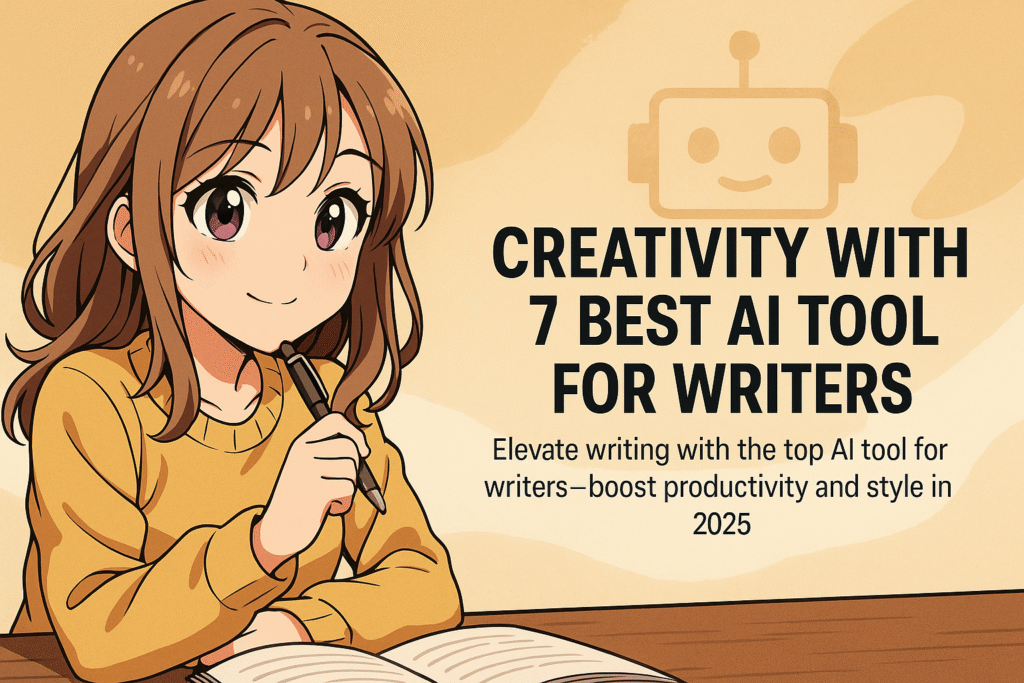Elevate writing with the top AI tools for writers—boost productivity and style in 2025.

Introduction
The art of writing has evolved dramatically as technology continues to transform the creative process. In recent years, the rise of AI tools for writers has empowered authors, bloggers, and content creators to craft impeccable prose faster and smarter than ever. Today, you have a range of intelligent assistants at your fingertips, reshaping how stories and ideas come to life.
Why Writers Need AI in 2025
Writers often face daily hurdles like writer’s block, tight deadlines, and the tediousness of editing. These challenges can stall creativity and sap motivation. Enter AI: modern tools offer real-time suggestions, grammar checks, tone analysis, and content generation. With an AI tool for writers, you can quickly polish drafts, maintain consistency, and generate fresh ideas—ensuring your words are always compelling and on point.
7 Best AI Tools for Writers
1. ChatGPT
ChatGPT offers intelligent text generation for brainstorming, outlining, or expanding content. Its standout feature is conversational ideation, perfect for overcoming creative blocks. Best for blog writing, storytelling, and idea generation. Available with free limited access and premium subscriptions.
2. Grammarly
Grammarly is your virtual editor, correcting grammar, punctuation, and style. Its unique tone detector helps match your message to the right audience. Ideal for academic writing, business emails, and everyday editing. Free and premium tiers available.
3. Jasper
Jasper excels at generating custom marketing copy, email templates, and SEO content from simple prompts. Its powerful long-form assistant is a highlight. Best if you’re focused on copywriting and digital marketing. Paid plans with trial options.
4. Sudowrite
Sudowrite supercharges creative writing with unique features like “Describe” and “Rewrite,” which refine your prose or generate sensory-rich descriptions. Tailored mainly for fiction and storytelling. Offers a paid model, with a trial for new users.
5. ProWritingAid
ProWritingAid goes beyond grammar checks, delivering in-depth reports on overused words, readability, and consistency. It’s favoured for comprehensive editing and manuscript reviews. Best for authors refining drafts. Both free and paid versions exist.
6. Rytr
Rytr generates engaging copy at scale, using multiple content templates and tones. Its easy-to-use interface sets it apart for quick blog and social media content. Useful for freelance writers and marketers. Free basic plan, paid for higher volume.
7. Quillbot
Quillbot is known for its paraphrasing and summarisation abilities, helping you reword content efficiently. Its integration with browsers and word processors makes it user-friendly. Ideal for academic or technical summaries. Free with limited features; paid access unlocks advanced modes.
How to Choose the Right Tool
When selecting an AI tool for writers, consider your primary goals—do you need help with creative writing, copywriting, editing, or speeding up the drafting process? Prioritise tools that align with your workflow and content type. Don’t hesitate to test free trials, as hands-on experience will reveal which solution best matches your personal writing style.
Conclusion
Embracing an AI tool for writers in 2025 means unlocking greater creativity, efficiency, and professionalism in your work. Explore the options above and discover how your writing process can be transformed—one intelligent suggestion at a time. Let these tools help you write your best this year!
AI tools for designers-
FAQ: AI Tool for Writers
1. What is an AI tool for writers?
An AI tool for writers is software powered by artificial intelligence that assists in writing tasks. These tools can generate text, correct grammar, offer style suggestions, and even help with brainstorming or structuring content.
2. How do AI tools for writers enhance productivity?
AI tools streamline your workflow by automating time-consuming tasks such as editing, proofreading, and idea generation. This lets you focus more on creativity and less on repetitive work, speeding up the entire writing process.
3. Are AI writing tools suitable for creative writing and fiction?
Yes, many AI writing tools, like Sudowrite and ChatGPT, offer features tailored to creative writing, such as plot suggestions, character development help, and vivid descriptions.
4. Can I use an AI tool for writers for free?
Most popular AI tools offer free plans or trials (e.g., Grammarly, Quillbot, Rytr), though advanced features usually require a paid subscription.
5. Will AI tools replace human writers?
No, AI tools are designed to assist, not replace, writers. They help generate ideas, correct errors, and enhance style, but human creativity and nuance are still essential for quality writing.
6. What is the best AI tool for writers for SEO content?
Jasper and Rytr are particularly strong choices for SEO-focused content, with features tailored to optimise keywords and search ranking.
7. How do I choose the right AI tool for my writing needs?
Consider your main goals (e.g., editing, creative writing, academic content), compare features, and try free versions to find a tool that matches your workflow.
8. Are my documents safe with AI writing tools?
Reputable AI tools use encrypted connections and follow privacy regulations. Always review the tool’s privacy policy to understand how your data is handled.
9. Can AI tools help overcome writer’s block?
Absolutely! Many tools generate prompts, expand ideas, or offer suggestions, making it easier to break through creative barriers.
10. Do AI tools support multiple languages?
Some AI tools, like Grammarly and Quillbot, support multiple languages and regional variants, but availability varies by platform.



